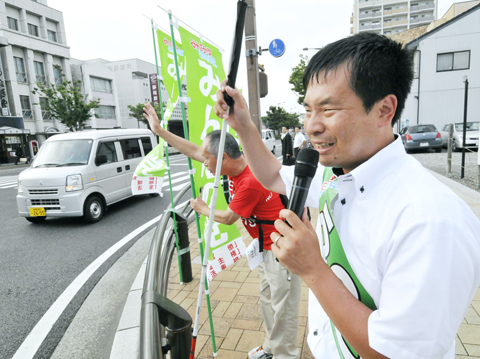Japanese political newcomer Junichi Kawai has been unable to see since he was 15, but he does have a strong vision for his country, which heads to the polls for upper house elections on Sunday.
The 35-year-old Paralympic gold medalist and former teacher is running on the ticket of Your Party, a small opposition group launched last year.
Kawai has already achieved fame in Japan, for winning five swimming gold medals at the Paralympic Games of 1996, 2000 and 2004 — a feat which was depicted in a movie entitled Seeking Dreams.

PHOTO: AFP
But he says he does not want to focus on his disability, instead seeking votes with his ideas for revamping the country, which he believes has lost confidence and suffers a lack of political leadership.
“I don’t want sympathy at all,” Kawai said after delivering a campaign speech in Shizuoka near Mount Fuji, a district where he is vying for one of two seats against five other candidates.
Instead he has called for reforms of the state bureaucracy, in the education sector and for economic growth.
“I’m just an ordinary schoolteacher who wants to create a society where children can have a dream,” a smiling Kawai said, holding a white cane in one hand and a microphone in the other.
“Disabled or not, people are having difficulties in their daily lives,” said Kawai, who married four years ago and has a baby son.
“The country is in a pinch, but it can be seen as a chance for reform. I have changed a problem into an opportunity in my life. I’m a man of change,” he said.
While disabled politicians are still rare in Japan, Kawai said he has felt inspired by Britain’s former education and home secretary David Blunkett, who has been blind since birth.
“I heard that the British minister ordered his bureaucrats to tell him only the essence of a document,” Kawai said. “It is the bureaucrats’ job to make the policies understandable.”
Kawai said he even sees his disability as an advantage.
“I’m blind, but because I’m blind, I can sense what is important,” Kawai said. “I can’t see things, but I have ears to listen to people’s voice. I can feel and share people’s pain.”
Kenji Eda, secretary general of Your Party, said Kawai “has been really engaged in education. I’m sure he can tackle education reforms.”
Voters at the campaign stop showed warm support.
“I have high expectations of him because he can represent the viewpoints of the disadvantaged,” said Etsuko Tanaka, a 45-year-old housewife.
Local media say Kawai is fighting a close contest in the election, which nationwide is a test for Prime Minister Naoto Kan, who took office last month and is trying to achieve full control of parliament.
Kan’s Democratic Party of Japan is reportedly sounding out chances of a partnership with Your Party, which is enjoying a surge in public support for its hard line against the nation’s powerful bureaucracy.
Experts say disabled politicians in Japan have concentrated on realizing greater rights and opportunities for the handicapped.
“But Mr Kawai’s political stance is not just based on conventional support for the disabled,” said Jun Ishikawa, professor of sociology and disability studies at the University of Shizuoka.
Kawai could be a “next-generation” politician with a disability, capable of appealing to both disabled and able-bodied voters, Ishikawa said.

Shamans in Peru on Monday gathered for an annual New Year’s ritual where they made predictions for the year to come, including illness for US President Donald Trump and the downfall of Venezuelan President Nicolas Maduro. “The United States should prepare itself because Donald Trump will fall seriously ill,” Juan de Dios Garcia proclaimed as he gathered with other shamans on a beach in southern Lima, dressed in traditional Andean ponchos and headdresses, and sprinkling flowers on the sand. The shamans carried large posters of world leaders, over which they crossed swords and burned incense, some of which they stomped on. In this

‘NO COUNTRY BUMPKIN’: The judge rejected arguments that former prime minister Najib Razak was an unwitting victim, saying Najib took steps to protect his position Imprisoned former Malaysian prime minister Najib Razak was yesterday convicted, following a corruption trial tied to multibillion-dollar looting of the 1Malaysia Development Berhad (1MDB) state investment fund. The nation’s high court found Najib, 72, guilty on four counts of abuse of power and 21 charges of money laundering related to more than US$700 million channeled into his personal bank accounts from the 1MDB fund. Najib denied any wrongdoing, and maintained the funds were a political donation from Saudi Arabia and that he had been misled by rogue financiers led by businessman Low Taek Jho. Low, thought to be the scandal’s mastermind, remains

Near the entrance to the Panama Canal, a monument to China’s contributions to the interoceanic waterway was torn down on Saturday night by order of local authorities. The move comes as US President Donald Trump has made threats in the past few months to retake control of the canal, claiming Beijing has too much influence in its operations. In a surprising move that has been criticized by leaders in Panama and China, the mayor’s office of the locality of Arraijan ordered the demolition of the monument built in 2004 to symbolize friendship between the countries. The mayor’s office said in

FIGHTING CONTINUES: Thai military dropped 40 bombs on border areas, Cambodia said, while Bangkok said Phnom Penh launched heavy attacks and damaged homes Cambodia yesterday accused Thailand of intensifying its bombardment of disputed border areas, even as officials from the two countries attend a multi-day meeting aimed at negotiating an end to deadly clashes. The neighbors’ long-standing border conflict reignited this month, shattering an earlier truce and killing more than 40 people, according to official counts. About 1 million people have also been displaced. Cambodian and Thai officials were in their third day of talks at a border checkpoint, with ministers of defense from the two countries scheduled to meet today. However, the Cambodian Ministry of National Defense said Thailand’s military carried out a heavy